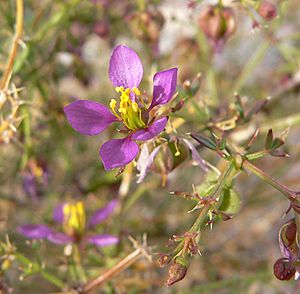California fagonbush facts for kids
Quick facts for kids California fagonbush |
|
|---|---|
 |
|
| Scientific classification | |
| Genus: |
Fagonia
|
| Species: |
laevis
|
| Synonyms | |
|
Fagonia californica |
|
The Fagonia laevis, also known as the California fagonbush, is a special type of plant. It belongs to the Zygophyllaceae, which is also called the caltrop family. This plant is a perennial subshrub, meaning it's a small, woody plant that lives for many years.
You can find the California fagonbush in the deserts of the southwestern United States and northwestern Mexico. It grows in places like California, southern Nevada, Arizona, and southwest Utah. It also lives in Sonora, Baja California, and Baja California Sur. This plant loves hot, dry hillsides and slopes. It grows best where it gets some rain during the winter or from summer monsoons.
What it Looks Like
The California fagonbush is a plant that spreads out close to the ground. It forms a kind of green carpet over rocks and hillsides. It can grow into small mounds, about 18 inches (4.5 decimeters) tall.
Leaves and Adaptations
This plant is related to the creosote bush. Like its cousin, it has special waxy leaves. These waxy leaves help the plant survive in the hot desert. The wax acts like a shield, stopping the plant from losing too much water.
The leaves are a dark green color. They are usually about half an inch long and narrow. Each leaf is made up of three smaller leaflets. The plant also has small, sharp points called stipules near the base of its leaves.
Where it Grows
You can often find the California fagonbush growing with other plants in what's called the "Creosote Bush scrub community." This plant community is common in the southern Mojave Desert, and parts of the Sonoran Desert. It also grows on the Baja California peninsula.
Flowers and Fruit
The flowers of the California fagonbush are quite pretty. They are shaped like stars and have five petals. The flowers are usually purple or lavender, with a white center. Some plants have more flowers than others.
The plant has leaves that grow opposite each other on the stem. Its flowers have a pink corolla, which is the part made up of all the petals. After the flowers bloom, the plant produces smooth fruits.
See also
 In Spanish: Fagonia laevis para niños
In Spanish: Fagonia laevis para niños

